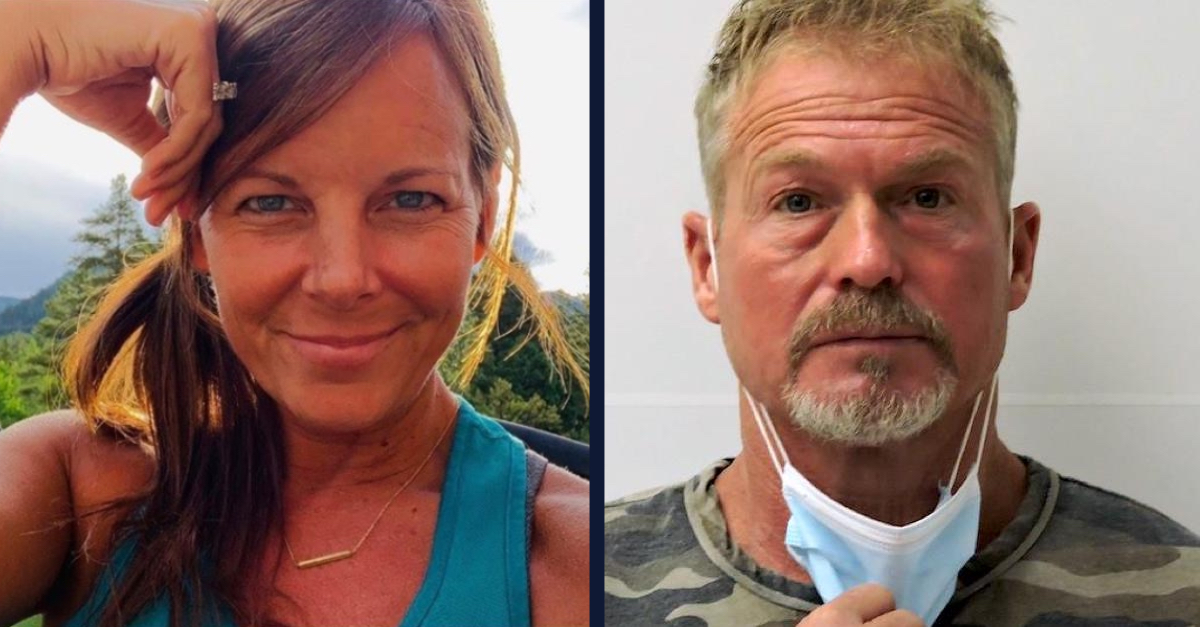
Suzanne Morphew and Barry Morphew appear in images distributed by the Chaffee County, Colo. Sheriff’s Office.
Despite scolding prosecutors and law enforcement agents for engaging in “consistent” discovery violations, a Colorado judge has refused to dismiss a swiftly approaching murder trial against Barry Morphew, the husband who stands accused of murdering his wife Suzanne Morphew on or around May 9 or 10, 2020. Suzanne Morphew’s body has never been found.
District Court Judge Ramsey Lama of the 11th Judicial District said, however, that he would limit expert testimony about cell phone data, vehicle movement data, and DNA — in part because prosecutors filed information about expert witnesses too late in the process and therefore missed important deadlines.
The case has been fraught with contention for months, Judge Lama noted in a complex, mostly-single-spaced, and 20-page-long order filed on April 8. The judge cited some of the evidence which plays to the prosecution — and other evidence which plays to the defense:
Data on Mr. Morphew’s phone indicated that around the time she went missing, he turned left on Highway 50, west, passing the location of where Mrs. Morphew’s bike helmet was found on the side of the road before ultimately turning around to head to Denver for work. Mr. Morphew said he was following an elk and turned around near Garfield, a small community about 3-4 miles west of where Mrs. Morphew’s bike was found. That and other location data on his phone raised suspicion among investigators.
[ . . . ]
In the summer of 2020, CBI forensic analysis determined foreign unknown male DNA was found on various items of the crime scene: the interior cushion of the bike helmet, Mrs. Morphew’s bike, the glovebox and back seat of Mrs. Morphew’s Range Rover. Mr. Morphew, along with other investigative personnel working the scene, were excluded as the source of the sample.
Colorado Bureau of Investigation (CBI) Agent Joseph Cahill came to suspect the aforementioned DNA sample found in the car “belonged to suspects who may have perpetrated the crime,” the judge noted. And then came a hit on that DNA in CODIS, a nationwide DNA database maintained by the FBI.
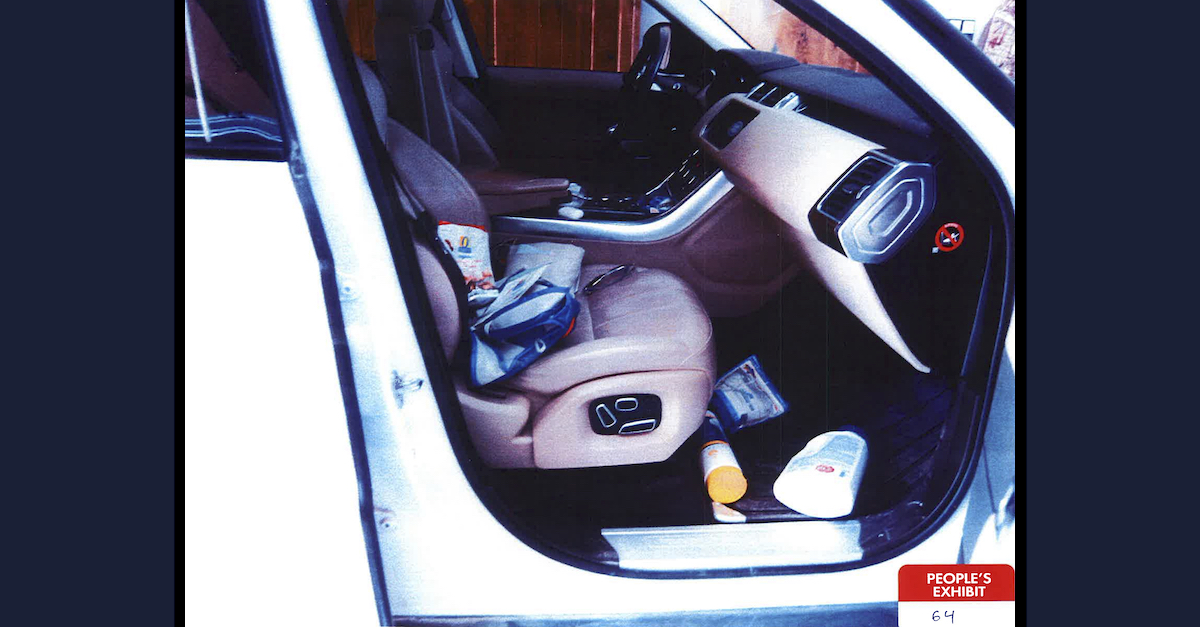
Evidence photo 64 shows the interior of Suzanne Morphew’s car.
“[T]he unknown male DNA partially matched DNA found in three out-of-state unsolved sexual assault investigations: Tempe, Phoenix, and Chicago,” the judge wrote. However, “due to the limited genetic profile, this was only a lead and further investigation was necessary.”
The unknown DNA led to a showdown between the CBI and the local sheriff’s office, the judge noted:
Sometime in late April of 2021, CBI detectives working on the case became aware that the Chaffee County Sherriff’s Office was going to arrest Barry Morphew charging him with murder. Agents Cahill and Graham strongly opposed the arrest of Barry Morphew citing the need for more forensic testing and evidence collection in general. They both believed the arrest was premature and raised their concerns with Kirby Lewis, head of the Major Crimes Division of CBI who, in turn, brought those concerns to Deputy Director Chris Schaeffer. Mr. Schaeffer called the Chaffee County Sheriff, John Spezze, and advised against arresting Mr. Morphew at that time. He expressed the concerns of Agents Cahill and Graham. It was the first time in the Deputy Director’s career that he ever called a sheriff about holding off on the decision to arrest an individual. Shortly, thereafter, CBI Director John Camper, called the Sheriff and reiterated the Bureau’s concerns with arresting Barry Morphew.
Regardless, Chaffee County Sheriff’s Commander Alex Walker “authored a 129 page affidavit in support of the arrest of Barry Morphew on suspicion of homicide along with other charges,” Judge Lama noted. “The affidavit states numerous agents from CBI reviewed and edited the affidavit, but failed to state that the Bureau did not support the arrest of Mr. Morphew.”
“Notably, as of May 4, 2021, law enforcement had still not determined the source of the unknown male DNA found throughout the crime scene,” Judge Lama continued. “The Affidavit failed to inform the judge of said DNA and that Barry Morphew was excluded as the source.”
In part, Lama noted, that was because Walker received a letter about the DNA match “on May 19, 2021, twelve days after he penned his probable cause affidavit in support of the arrest of Mr. Morphew.” But the state did not attempt to cure the issue by the time a four-day hearing rolled around in August, Judge Lama indicated.
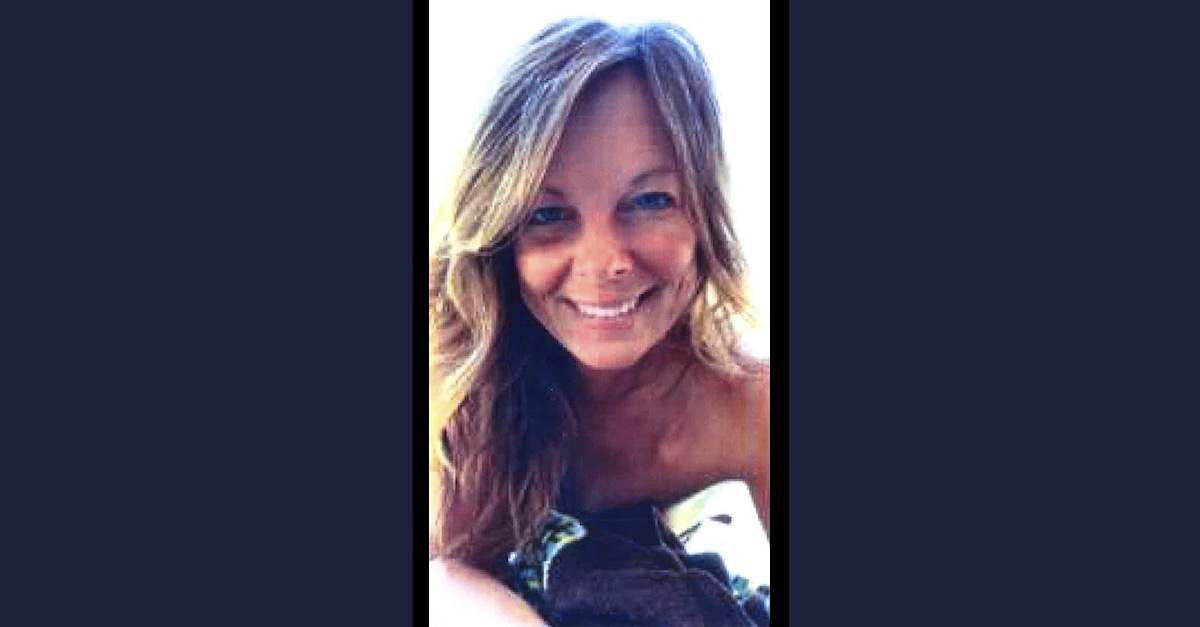
A prosecution evidence photo (exhibit 59) portrays an image of Suzanne Morphew dated May 9, 2020, at 2:03 p.m. It is alleged to be the last known photo of Suzanne Morphew alive.
A different judge, Chief Judge Patrick W Murphy, appears to have been wholly unaware of the DNA issue when he signed off on the arrest papers, and law enforcement officers took Barry Morphew into custody on May 5, 2021. Two weeks later, the state turned the CODIS data over to the defense on May 19, 2021. But then, Judge Lama wrote, the state struggled to figure out how to deal with it:
In the months leading up to and during the Preliminary Hearing, the prosecution had three meetings with law enforcement and CBI analysts to discuss the meaning of the CODIS match, its significance, and follow up investigation to rule out potential sources of the DNA. Information tending to negate the guilt of accused was discussed, but nothing was reduced to writing and disclosed to the defense in any of the three meetings. The Preliminary Hearing commenced on August 9, 2021 and lasted four days. The People called the following witnesses: Alex Walker, Kenneth Harris, Jonathan Grusing, Derek Graham, Andy Rohrich, and Kevin Koback. The People did not elicit any testimony concerning the foreign male DNA from any of these witnesses. The defense ultimately called Agent Cahill of CBI to present the information to the Court. The Court reserved ruling.
Eventually, on Sept. 17, 2021, a previous judge reasoned that the unknown DNA was “particularly significant because while it doesn’t prove a stranger abduction theory, it does at least support it,” and Barry Morphew was allowed to go free on bond pending trial after being jailed without bond for about five months.
Morphew’s defense moved multiple times for discovery and contempt sanctions — and to dismiss the case.
“The multiple and continuing hearings . . . have revealed substantial evidence that law enforcement personnel testified falsely, and the prosecutor presented this false testimony, in pleadings and at pretrial hearings on key issues related to the litigation,” the defense wrote on March 9. “This conduct has destroyed Mr. Morphew’s right to a fair trial. When these witnesses testify at trial, Mr. Morphew will have the right and obligation to point out to the jury that, in this very case on that very witness stand, the witness(es) told falsehoods in an attempt to cover up the truth about the investigation.”
“It will be imperative not only to point out the factual reasonable doubt, but to raise doubts about the law enforcement officers presenting the prosecution’s evidence,” the defense continued on March 9. “It is patently unfair to make Barry Morphew face trial on the shoulders of this false testimony. He asks this Court to dismiss this case because a fair trial cannot be held under the circumstances of these falsehoods and cover-ups.”
Judge Lama’s 20-page order from Friday spends pages upon pages recapping discovery matters, meetings, and other relevant dates before railing on the prosecution for botching many of the foregoing.
“In the instant case, the Defendant sat in jail for five months on a no bond hold prior to receiving a [hearing] on August 9-10 and 23-24, 2021,” Judge Lama wrote. “The Judge who found probable cause and set a no bond hold was not told that unknown foreign male DNA was found on various items at the crime scene or in the alleged victim’s car at the time of signing the warrant for Mr. Morphew’s arrest. (Citation omitted.) If the Judge had known at the time of reviewing the arrest warrant about foreign unknown male DNA and CODIS matches to out-of-state cases, he may not have required Mr. Morphew to sit in jail for five months pending the PEPG and Preliminary Hearing.”
After noting that it was defense attorneys, not the state, who finally noted the CODIS match to the original judge on the case, Judge Lama continued with stern language for the prosecution and for law enforcement (citations omitted):
It is clear to this Court there is a pattern of discovery violations in this case attributable to the People . . . . The People’s first discovery and disclosure-related violations occurred on July 22, 2021 while Chief Judge Murphy was still assigned to the case. These violations continue and are ongoing. As recent as March 30, 2022 (less than one month before trial is set to begin), the Court found another Rule 16 violation related to an expert report of Doug Spence. Over the last eight months and over multiple days of hearings, the Court has witnessed a pattern of disregard by the People towards its Rule 16 obligations, the Court’s Case Management Order, and subsequent Court disclosure-related orders made on the record. This Court has repeatedly noted it does not, in any way, condone the People’s behavior. The behavior has, in the Court’s eyes, been recognizably consistent. While the Court, for the reasons stated below, does not find this pattern willful based on the record, the Court does find this pattern to be negligent, bordering on, reckless.
Judge Lama said the “most obvious and egregious violation” surrounded the state’s lack of complete candor regarding the CODIS match to a possible unknown suspect’s DNA.
“These type of materials, as noted by Chief Judge Murphy during his ruling on bond in September 2021, lend themselves to an alternate suspect theory of the case,” Lama wrote. “Yet, we know law enforcement was well aware of this information for months prior to seeking Mr. Morphew’s arrest.”
The meetings about that CODIS information should have been reduced to writing and disclosed to the defense, Judge Lama rationed, because they involved “discoverable materials.” The failure to do so, Judge Lama wrote, was a violation of Colorado court rules and of previous court orders in this case in particular.
After citing specific communications among law enforcement investigators, Lama also chided Cahill for having “testified that he only reviewed 19 pages of the arrest affidavit” despite issuing “disclosures” which “indicated he had reviewed it in its ‘entirety’ and even offered specific critiques to the affiant.” And, the affidavit itself stated that it “was edited and reviewed by SA Kenneth Harris and CBI Agents Joseph Cahill and Derek Graham.”
Judge Lama also scolded the state for an “ineffective” system of preserving investigators’ emails — despite an order from previous Judge Murphy that such materials needed to be saved.
Elsewhere, Judge Lama upbraided the state for missing an already “extended deadline” on Feb. 28, 2022 for data involving “numerous expert witnesses.” Citing the “pattern of discovery violations,” the judge noted that he banned the state from calling any expert whose report was not turned over to the defense by that February deadline.
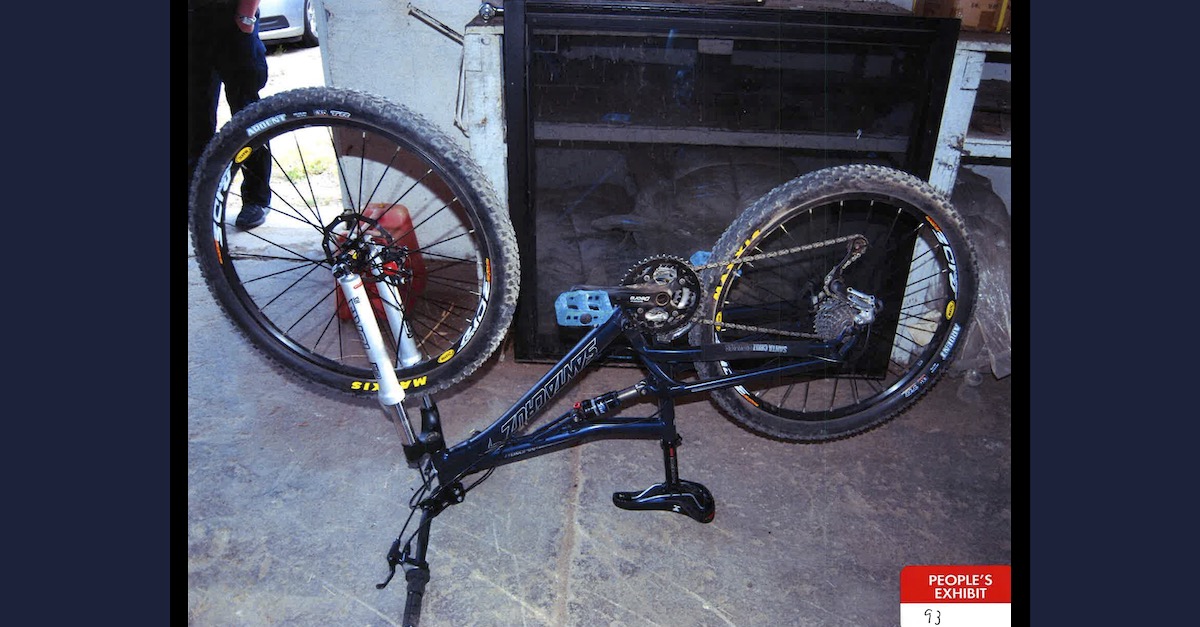
State’s evidence photo 93 shows Suzanne Morphew’s bicycle.
One witness the state admitted it would not be able to call was Doug Spence, the canine handler of a dog named “Rosco.” According to Judge Lama’s ruling, the state asserted that Rosco did not pick up a “hit” on or around Suzanne Morphew’s abandoned bike in the ravine where it was found; the state was hoping to argue that the dog’s alleged failure to pick up the alleged victim’s scent was proof that the bike had been hidden by someone else.
But that’s not the end of that story. At at hearing, the court allowed the defense to call Spence to figure out what information had indeed been gleaned from the dog. It turned out, according to Spence’s testimony and body camera footage admitted into evidence, that Rosco did pick up Suzanne Morphew’s scent on the nearby south Arkansas River. The dog pulled Spence downstream but lost the scent at a log.
The state backtracked by claiming the dog “kept trying to go in the direction of the Morphew home but could not get there due to a creek,” Judge Lama wrote. “This was false based on the testimony and evidence presented at the Hearing. Indeed, Mr. Spence unequivocally testified that had Rosco picked up a scent across the creek or in the creek he would have pulled him right into the creek and even crossed the creek if necessary. According to Doug Spence, his dog did not go into the creek because it did not alert to the scent of Mrs. Morphew in that direction or vicinity: Rosco simply lost the scent.”
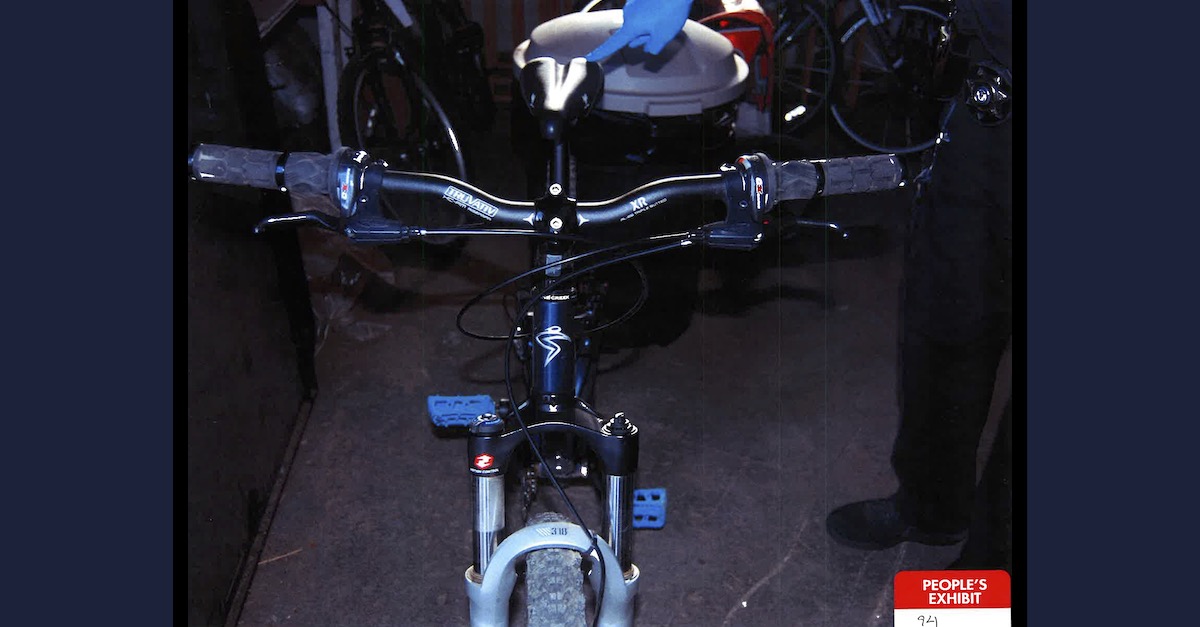
State’s evidence photo 94 shows Suzanne Morphew’s bicycle.
“Mr. Spence unequivocally denied that his dog was attracted to the water or the direction of the Morphew home,” Judge Lama continued. “It is abundantly clear that the People failed to consult with Mr. Spence, an endorsed expert, prior to making their expert disclosures.”
And here, Judge Lama reasoned, is why that is important:
The People’s expert disclosures contained inaccurate statements authored by Sergeant Plackner and the district attorney, who in turn, drew additional inferences based upon statements that were never correct in the first place. Mr. Spence’s testimony is potentially exculpatory. At a minimum, in does not lend support to the People’s theory that Mrs. Morphew was never there and that Mr. Morphew staged a crash scene. According to Mr. Spence, Rosco picked up Mrs. Morphew’s scent at the scene.
Despite these and other failures, Judge Lama found that the state’s actions did not “amount to willfulness,” so the case will continue — but without a bevy of expert opinions as listed toward the end of the ruling.
“[T]he Court does not find a reduction of the charges to be an appropriate remedy,” Judge Lama ruled. “The Court is also mindful that the defense is now in possession of exculpatory information, which cures much of the prejudice.”
“Because the Court did not find willfulness on the part of the People, dismissal of the case is beyond this Court’s discretion,” the judge added.
One of the recent defense motions to dismiss, and the judge’s full ruling, are both below:
[images as noted]